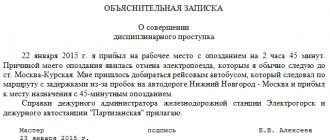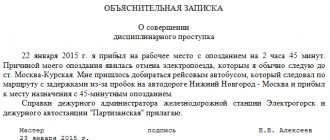Statute of limitations for misconduct for disciplinary action
The disciplinary sanction may be terminated early. However, it is not recommended to reduce it to less than six months. An order to impose a disciplinary sanction - what is the difference from other types of orders for personnel? A disciplinary sanction is applied to an employee who has committed an offense in the form of a reprimand, a reprimand, or, as a last resort, dismissal. Various documents are drawn up: protocols, acts, reports and explanatory notes, letters of complaint, etc. But the main thing is the order. Most documents relating to personnel are unified. They are brought to a single form for convenience and simplification of work. However, orders for a reprimand or reprimand are issued freely. This is due to the fact that it is not possible to bring all variants of violations to a single type; they are specific to each organization.
What did my employer do wrong?
Either the administration at my enterprise did not know all the subtleties, or they were simply confused about the deadlines. I was disciplined after the legal period had expired. And the order to impose reprimands was also presented at the wrong time - on the fourth working day.
My immediate superior found out about my mistake the same day. An internal investigation was ordered, which lasted 28 days. In the conclusion of the commission for conducting an internal investigation, it was found that I violated the requirements of local regulations. By order of the deputy director, I was subject to disciplinary action in the form of a reprimand. It took 22 days to release.
I knew that these terms were contrary to the labor code. I was also hurt by the attitude towards me during the internal investigation. Therefore, instead of making excuses, I decided to challenge the order to impose a disciplinary sanction. I thought that this would be a quick and easy victory and that the issue would be resolved in ten days. But everything turned out wrong.
Disciplinary action - what is it?
If an employee refuses to leave a signature, it is necessary to draw up a report and make a corresponding note in the document. It should be remembered that disciplinary action is applied no later than six months after the violation was committed and no later than a month from the date of its discovery. The calculation of this time does not include days of vacation, illness, business trips, and all other periods of time when the employee was absent from the workplace for a valid reason. In addition, the time it takes for the collection documents to be considered by a representative body or trade union is taken into account.
It is important to know that one type of penalty can be imposed on an employee for one offense. It is unacceptable to first reprimand an employee for being late and then fire him for it. Collection documents are stored in a separate folder, away from other personnel papers.
Early withdrawal of foreclosure
Typically the duration of a disciplinary sanction is one year. But it can be reduced:
- on the personal initiative of the employer;
- at the personal request of the employee;
- at the request of a trade union or other representative body;
- at the personal request of the employee’s immediate supervisor.
The employer may apply early termination of a disciplinary sanction at any time. The sample order or order will be similar to other non-standard personnel documents.
The employee may himself request early removal of the reprimand or reprimand. In this case, they write a memorandum and attach a statement. The same documents are drawn up by the trade union and the head of the unit. In case of early withdrawal of the penalty, it will be considered that the employee did not have it. All supporting documents are destroyed.
Statute of limitations for bringing disciplinary action
Their storage period is the same as the normal period of validity of the foreclosure; upon termination, all acts, letters, explanatory and memorandums and orders are subject to destruction. You can include copies in your personal file, but they should be deleted when finished. Validity period of disciplinary sanctions The validity period of a disciplinary sanction is 12 months from the date of issue of the order. If the employee commits another offense, then this period is extended until the end of the last one. The extreme measure of punishment for an employee is dismissal. In this case, the disciplinary sanction is indefinite and cannot be canceled by the administration. However, it can be terminated by the labor dispute commission and the employee reinstated in his position. A dismissed employee may be rehired at the enterprise in another division and on other conditions, in which case he is considered not to have a penalty.
This is important to know: A reprimand or reprimand as a disciplinary sanction: consequences
Methods of challenging
When an employer has violated the procedure or deadlines for bringing to responsibility, the employee can appeal the imposed punishment. It should be borne in mind that the manager does not have the right to impose a penalty without requiring an explanatory note from the employee. It is also impossible to apply disciplinary measures if an employee was absent from work due to illness, as evidenced by a certificate of incapacity for work. It is not allowed to impose several punishments for one offense. In addition, the specialist may not agree with the fact of being held liable or with the type of penalty.
The employee is given three months from the date of the sanctions to appeal the employer’s actions, but if the person was fired, then the period is one month. To challenge a punishment order, you can file a complaint with the state labor inspectorate, a labor dispute commission, or file a claim with the judicial authorities.
If an employee goes to court, a judicial investigation will be conducted, following which the government agency will make a decision in favor of the plaintiff or his employer. If the court takes the employee’s side, the employer will be obliged to compensate the employee for all expenses, cancel the punishment, and in case of dismissal, reinstate the plaintiff in his position.
Deadline for disciplinary action
Article 193 of the Labor Code of the Russian Federation provides for 3 types of disciplinary sanctions:
- remark (reprimand);
- severe reprimand;
- The last resort is dismissal.
It is worth mentioning that such preventive measures as deprivation or reduction of an employee’s bonuses are not disciplinary measures established by law. In order for an employer to use this method of stimulating an employee, it is necessary to enshrine such norms in the organization’s legal regulations or in an agreement concluded with the employee. Grounds for application of disciplinary sanctions The basis for imposition can be considered a violation of the terms of the agreement concluded between the employee and the employer, affecting the normal activities of the enterprise. If such violations are identified, the employer has the right to apply one of the types of disciplinary sanctions indicated above. If the employee does not provide such an explanation and refuses to give it, then an act of refusal is drawn up with the signatures of several witnesses; this act is also attached to the documents that serve as the basis for imposing a penalty. Once a violation has been established and properly documented, an order for disciplinary action or an order for dismissal is issued. Limitation periods For carrying out the procedure for imposing a disciplinary sanction, there are deadlines that cannot be violated, otherwise the imposition of punishment will be considered unlawful. Disciplinary action is applied and must be formalized and come into force no later than one month from the date of discovery. If an act that is subject to punishment is discovered later than six months from the date of commission, then the penalty cannot be imposed due to the expiration of the period.
Registration deadlines
The terms for imposing a disciplinary sanction, as well as the requirement to limit the time limit on paperwork on this issue, are contained, first of all, in the Labor Code of the Russian Federation. Articles 193-195 of the Labor Code of the Russian Federation imply the following chronology of registration:
- the performer has committed a disciplinary offense - the employee’s immediate supervisor issues a memo to the director of the enterprise about the violation committed;
- the employer requests from the guilty person an explanatory note outlining his point of view on any negative event that occurred due to the fault or with the participation of the employee, explaining the reasons and circumstances of the incident;
- explanatory note provided. If not, an act of refusal to provide it is drawn up at the place of work;
- the employer studies the circumstances of the case, in some cases assembles commissions to consider the issue, conducts audits, consultations with specialists, investigations - depending on the nature of the violation;
- the manager determines the degree of guilt of the person punished and the measure of punishment: reprimand, reprimand or dismissal of the employee, an order is issued to impose a disciplinary sanction;
- The culprit is introduced to the order against signature. If a refusal is received, a report is drawn up;
- the employee submits an application for removal of the penalty in any form. As an option, the immediate manager or trade union committee, standing up for the person punished, files a petition for removal;
- The disciplinary sanction is lifted ahead of schedule or upon expiration of the term.
We suggest you read: When do you need to pay the state duty for your license?
For almost each of these stages, deadlines are defined, after which the executed documents are considered void, that is, the action is considered inconsistent with the law.
Article 193. Procedure for applying disciplinary sanctions Before applying a disciplinary sanction, the employer must request a written explanation from the employee. If after two working days the employee does not provide the specified explanation, then a corresponding act is drawn up.
Failure by an employee to provide an explanation is not an obstacle to applying disciplinary action.
Disciplinary action is applied no later than one month from the date of discovery of the misconduct, not counting the time of illness of the employee, his stay on vacation, as well as the time necessary to take into account the opinion of the representative body of employees.
A disciplinary sanction cannot be applied later than six months from the date of commission of the offense, and based on the results of an audit, inspection of financial and economic activities or an audit - later than two years from the date of its commission. The specified time limits do not include the time of criminal proceedings.
For each disciplinary offense, only one disciplinary sanction can be applied.
The employer's order (instruction) to apply a disciplinary sanction is announced to the employee against signature within three working days from the date of its publication, not counting the time the employee is absent from work. If the employee refuses to familiarize himself with the specified order (instruction) against signature, then a corresponding act is drawn up.
A disciplinary sanction can be appealed by an employee to the state labor inspectorate and (or) bodies for the consideration of individual labor disputes.
Article 194. Removal of a disciplinary sanction If, within a year from the date of application of the disciplinary sanction, the employee is not subject to a new disciplinary sanction, then he is considered to have no disciplinary sanction.
The employer, before the expiration of a year from the date of application of the disciplinary sanction, has the right to remove it from the employee on his own initiative, at the request of the employee himself, at the request of his immediate supervisor or a representative body of employees.
Article 195. Bringing to disciplinary liability the head of the organization, the head of the structural unit of the organization, their deputies at the request of the representative body of workers The employer is obliged to consider the application of the representative body of workers about the violation by the head of the organization, the head of the structural unit of the organization, their deputies of labor legislation and other acts containing labor standards rights, terms of the collective agreement, agreement and report the results of its consideration to the representative body of workers.
If the fact of violation is confirmed, the employer is obliged to apply disciplinary action to the head of the organization, the head of the structural unit of the organization, and their deputies, up to and including dismissal.
As the law states, disciplinary sanction is applied no later than one month from the moment or from the date of discovery of the misconduct by the employer.
The specified period does not include the time when the offender was sick, was on vacation, or the trade union committee or the council of the labor collective became acquainted with the circumstances of the case. There are no other reasons for extending the document.
The deadline for applying a penalty is 6 months, after which the case is not subject to consideration and the employee can no longer be punished.
If the violation concerns financial and economic activities, for example, based on the results of an audit, inspection of financial and economic activities or an audit, the maximum period of disciplinary action is extended to two years, if judicial proceedings are opened on it - until the end of the investigation.
The period for familiarization with the order is three working days after its release. The document must be delivered to the employee against signature. Cases of refusal are recorded in a commission act.
An explanatory note must be received before the order is issued.
If the guilty person is not at work at this time, you can notify him of the need to give an explanation by sending a telegram to the place of registration.
In case of refusal or failure to provide an explanation within two days, a report is drawn up.
An employee who, in an explanatory note, proves the fact of the absence of intent in the offense or the fact of the impossibility of conscientiously performing his labor functions (forced absenteeism, tardiness, illness, performance of public duties), in turn, must attach evidence for justification.
This could be a certificate of an accident, a summons. Two days are given to collect and submit such attachments to the explanatory note.
Example: The site manager instructed the industrial premises cleaner to collect construction waste. During the day, the task was not completed, the worker expressed disagreement with the task, and after the lunch break did not appear at the site.
Based on the report from the head of the site, the next day the cleaner was given a penalty for refusing to restore order and being absent from the workplace for more than four hours. A day later, the punished person showed up at work and presented a certificate from the blood transfusion station about donating blood on the specified day. The order had to be cancelled.
How long is a disciplinary sanction order kept?
Regarding the statute of limitations or storage of orders for disciplinary sanctions, there is a “List of standard management documents generated in the activities of organizations, indicating storage periods” (approved.
Statute of limitations for misconduct for disciplinary action
Appealing a disciplinary sanction by staff An employee has every right to appeal the disciplinary action. To do this, he should contact the district commission for resolving labor disputes. Further consideration of the case may be referred to the prosecutor's office or court.
If the employer made gross errors in the preparation of documents, or overlooked any stage, then the court decision will be on the employee’s side. If the foreclosure is declared invalid, all documents about it are subject to destruction. If an employee is fired, he is reinstated in his previous position.
At the same time, he is paid compensation for all days missed at work in the amount of average earnings. Dismissal is an extreme disciplinary measure. Of the three types of disciplinary penalties, dismissal is permanent and often irreversible. For example, by order of the Ministry of Justice of Russia, instructions were approved on the procedure for applying the regulation “On service in the bodies of the Ministry of Internal Affairs of the Russian Federation...” dated 06.06.2005 No. 76 (hereinafter referred to as the Instructions), containing penalties not provided for by the Labor Code of the Russian Federation. Dismissal as a form of punishment is allowed only on the grounds provided for by the Labor Code of the Russian Federation or a regulatory act. The exception is special categories of workers, for example, those working remotely (Part 1 of Article 312.5 of the Labor Code of the Russian Federation) or managing an organization (Clause 2 of Part 2 of Article 278 of the Labor Code of the Russian Federation). For these categories, additional grounds for dismissal can be agreed upon in the employment contract. IMPORTANT! Bringing employees to types of disciplinary liability that are not enshrined in legislative and by-laws is not allowed (Part 4 of Article 192 of the Labor Code of the Russian Federation).
The employer should assume how this or that type of punishment will affect the production process. There is no need to punish employees for the slightest insignificant offense. Being a couple of minutes late is a reason to express dissatisfaction, but not so significant as to issue an official reprimand.
As a result, an employer who abuses penalties develops a bad reputation in the labor market, and it becomes increasingly difficult for him to find new employees. Disciplinary action affects both the employee and the organization. Employees should understand that such measures are often forced and almost always temporary. Date of publication: November 26, 2015 Complain and discuss on the website Distribute the information on social networks, maybe it will help someone: Similar articles
- The employer does not pay wages, what should I do?
- Who pays for sick leave and according to what documents?
- Amount of maternity benefit and processing sequence
- Forced to resign - what to do in this situation?
What about vacation?
As stated in the documentation issued by the Supreme Court, if an employee is on paid leave granted to him by the employer on grounds that fully comply with the current law, such a time period interrupts the month-long period provided for issuing a penalty based on the discovered fact of violation of discipline. Also, the interval is interrupted if the employee is on another vacation entitled to him according to our laws. This includes vacations associated with studying at a specialized institution, as well as temporary periods that the employer provides to the employee without retaining his salary for this time. If the employee has received additional leave, the monthly period is extended by this time period.
Disciplinary responsibility: types
In Art. 192 of the Labor Code of the Russian Federation establishes that for guilty misconduct by an employee related to the performance of his official duties, the employer has the right:
- make a remark;
- reprimand;
- dismiss from work.
For special categories of employees and certain sectors of the economy, laws and departmental acts may introduce other rules of disciplinary liability (the reference norm is contained in the Labor Code of the Russian Federation).
This is important to know: Order to impose disciplinary liability: sample order
For example, by order of the Ministry of Justice of Russia, instructions were approved on the procedure for applying the regulation “On service in the bodies of the Ministry of Internal Affairs of the Russian Federation. » dated 06.06.2005 No. 76 (hereinafter referred to as the Instructions), containing penalties not provided for by the Labor Code of the Russian Federation.
Dismissal as a form of punishment is allowed only on the grounds provided for by the Labor Code of the Russian Federation or a regulatory act. The exception is special categories of workers, for example, those working remotely (Part 1 of Article 312.5 of the Labor Code of the Russian Federation) or managing an organization (Clause 2 of Part 2 of Article 278 of the Labor Code of the Russian Federation). For these categories, additional grounds for dismissal can be agreed upon in the employment contract.
IMPORTANT! Bringing employees to types of disciplinary liability that are not enshrined in legislative and by-laws is not allowed (Part 4 of Article 192 of the Labor Code of the Russian Federation).
A number of disciplinary sanctions (reprimand, reprimand) have a validity period: they are automatically lifted after 1 year from the date of imposition, if the employee did not have any other penalties during this period. The penalty can be lifted earlier - at the request of the employee or his boss.
Legal regulation
There are separate provisions of the Labor Code that are devoted to disciplinary sanctions and their application in practice.
For example, part 1 of Article 192 of the Labor Code of the Russian Federation says that an employee, in principle, has the right to be held accountable if he has committed an offense. Parts 3 and 4 mention the periods during which such penalties can be applied.
Your own deadlines for applying penalties can be provided for in separate regulations developed for a particular company. But most employers try to adhere to the standard provisions of the Labor Code.
Procedure and statute of limitations for bringing to disciplinary liability
In Art. 193 of the Labor Code of the Russian Federation establishes that in relation to employees who have committed any guilty offenses related to their official duties, disciplinary action is allowed within the time limits specified below:
- no later than 1 month from the day on which the fact of the violation was discovered;
- no later than six months from the day the violation was committed;
- no later than 2 years from the date of the violation, when it is revealed as a result of an audit, audit or other type of verification of activities;
- no later than 3 years from the date of violation of the anti-corruption restriction or ban.
At the same time, the specified periods for bringing to disciplinary liability do not include:
- employee sick days;
- days of his vacation;
- the time during which the employer needs to take into account the opinion of the representative body of the team;
- the time during which criminal proceedings were carried out against the employee.
When holding an employee accountable, the employer is obliged to request an explanatory note from him. However, the employer can hold the employee accountable even in the absence of such liability. If an employee does not submit an explanatory note for more than 2 days, then a report is drawn up regarding this matter.
Disciplinary involvement is formalized by an order, a copy of which is given to the employee within 3 days from the date of issuance, not counting the days when the employee was absent.
Who imposes a penalty on an employee by his own will, read the article Which bodies impose disciplinary liability?
When and how is discipline applied at work?
Bringing disciplinary action against an employee is not easy.
The Labor Code protects workers from unlawful actions of employers. To impose a penalty on an employee, you need to draw up a bunch of acts and orders and meet specific deadlines. Once misconduct is discovered, the employer must request a written explanation from the employee. If the employee does not provide an explanation within two working days, the employer is obliged to draw up a report about this. Then an internal investigation of the misconduct is carried out or a violation of official duties report is drawn up, confirming the fact of violation of labor discipline.
Only after this the employer issues an order to impose penalties on the guilty employee. The order must indicate why the employee is punished and what penalty is applied to him. The order is drawn up on the basis of the conclusion of an internal investigation or an act of violation of labor discipline.
The employee is familiarized with the order to apply a disciplinary sanction against his signature within three working days from the date of its issuance. The time when an employee is absent from work is not counted. If the offender gets sick or decides to take a vacation, he will still be familiarized with the order - but the period of familiarization will be counted from the moment the employee returns to work.
The law establishes another deadline that the employer must comply with in order to bring the employee to disciplinary liability. A disciplinary sanction cannot be applied later than six months from the date of commission of the offense - or two years if the offense was discovered as a result of an audit or inspection of financial and economic activities. The exception is penalties for corruption. It applies no later than three years from the date of commission of the offense.
That is, in order to impose a disciplinary sanction, the employer must comply with both deadlines: from the day of discovery and from the day the offense was committed.
Documentation. After applying a penalty, the employer must have the following documents:
- An employee’s statement of failure to fulfill duties or an act of refusal to give explanations.
- The conclusion of an internal investigation or an act of violation of labor discipline.
- Order imposing a disciplinary sanction.
- A document that confirms that the employee has familiarized himself with the order to impose a penalty within the prescribed period or refuses to familiarize himself with it. This may be the order itself with the employee’s signature or an additional act.
If at least one of these documents is missing, the disciplinary sanction can be considered illegal.
Consequences of disciplinary liability
The disciplinary sanctions listed in the Labor Code and other laws are a measure of employee liability for improper fulfillment of their obligations under the contract.
The imposition of a penalty has certain consequences for the guilty employee:
- in paragraph 5 of Art. 81 of the Labor Code of the Russian Federation establishes that failure by an employee to fulfill his duties may be grounds for dismissal if he already has a disciplinary sanction (the Constitutional Court, in its ruling dated December 9, 2014 No. 2749-O, established that the absence of the fact of challenging a disciplinary sanction on the part of an employee is recognized as significant evidence of the legality of dismissal);
- according to Art. 348.11 of the Labor Code of the Russian Federation for sports disqualification or violation of anti-doping rules with an athlete, the employment contract can be terminated;










